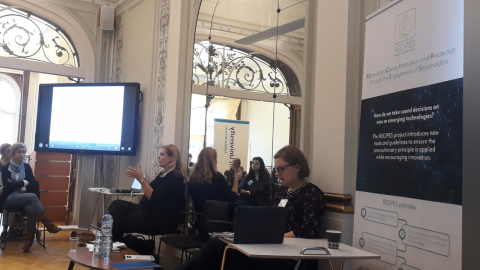RECIPES' General Assembly: setting the steps ahead
Nine months from the beginning of the RECIPES project (REconciling sCience, Innovation and Precaution through the Engagement of Stakeholders), the Consortium convened in Brussels to look at interim results and discuss the next steps.
Various project findings have been presented and discussed in detail by the Consortium partners. Furthermore, critical input was provided by the Advisory Board Members, including Howard Chase, Senior Director of Government Affairs for The Dow Chemical Company, Nina Holland from the Corporate Europe Observatory, Marian Schaapman, Head of the Health & Safety and Working Conditions Unit of the Research Department of the European Trade Union Institute (ETUI), and Christine von Weizsäcker.
Suggestions and additional valuable information was provided on three main project findings:
- - The Report on “The effect of the Precautionary Principle (PP) since 2000
- - Media analysis conducted on Le Monde, The Guardian and The Suddeutsche Zeitung
- - The 10 citizens’ meetings conducted in Bulgaria, Norway, Italy, Denmark and the Netherlands
The objective of the report on the effect of the PP, which is currently undergoing revisions, is to examine the effect and the application of the PP since 2000 by combining legal analysis, desk research and a narrative literature review, and to clarify the relationship between precaution and innovation.
Results from the media analysis on articles about the PP have been presented. The analysis covered how the public debate has been framed and how it has changed since 2000. The analysis has been conducted by the IASS, the University of Bergen and Maastricht University. Furthermore, the analysis looks at what values and presumptions European citizens have in regards to the PP. The analysis included articles from Le Monde, The Guardian and The Suddeutsche Zeitung.
Partners also reported from citizen interviews held in May/June 2019. In general, the participants’ view on precaution and innovation was that they were not in contradiction with each other and some consensus consisted of the need to look at innovation and precaution on a case-by-case basis.
As a next step, eight case studies will be conducted in the next months. These cover the following aspects:
- - New Gene-Editing techniques (CRISPR-Cas9)
- - Genetically Modified organisms (GMO’s)
- - Endocrine Disruptors
- - Neonicotinoid insecticides
- - Nano-technologies
- - Glyphosate
- - Finance, risks and urban water infrastructure
- - Artificial Intelligence
The case studies will be conducted to understand and explain the potential differences in the application of the precautionary principle, in a way that reflects the particular context of the case and the arguments for invoking the precautionary principle.
A more detailed overview of the case studies can be found HERE.
The RECIPES project is funded under the European Union's Horizon 2020 Programme for Research and Innovation and is implemented by 11 consortium partners from all geographical regions of Europe. Involved are three leading academic groups in the field of the precautionary principle (from Maastricht University, University of Bergen, and Humboldt-University Berlin), three major European players in Technology Assessment (Rathenau Institute, the Danish Board of Technology and the Austrian Academy of Sciences) and five leading non-profit research institutes (Dialogik, Ecologic Institute, IASS, ARC-FUND and K&I).
Prof. Dr. Ellen Vos and Dr. Kristel de Smedt

